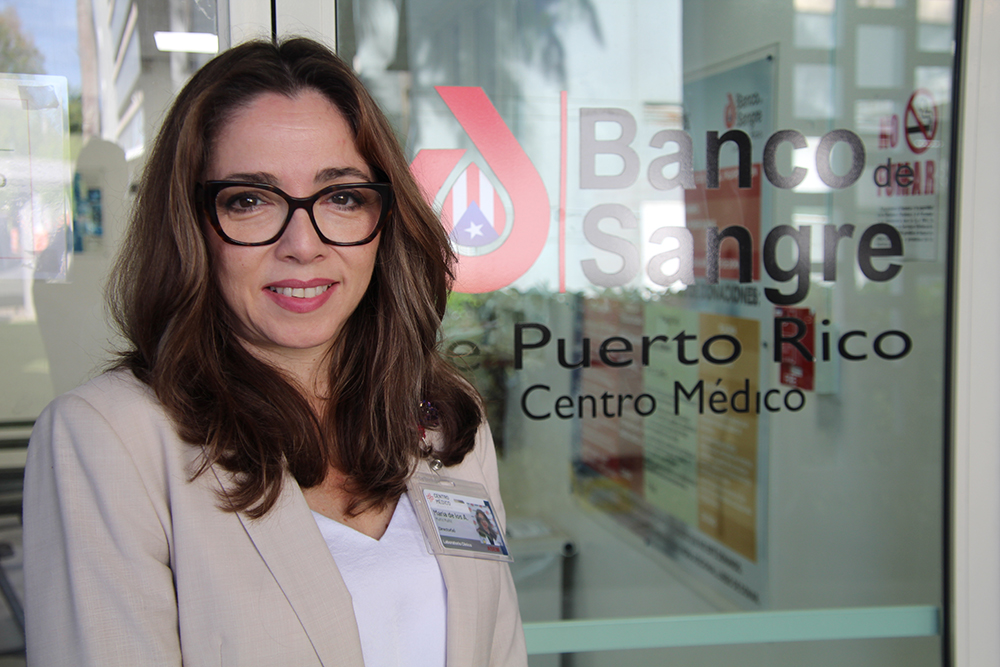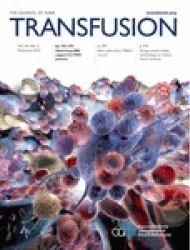
Maria De Los Angeles Muniz, MD, completed her bachelor’s degree in biology, followed by a medical technology degree at the University of Puerto Rico, and the Interamerican University, respectively. She then completed her medical school education at Ponce School of Medicine in Puerto Rico, later moving to the United States. She completed her training in anatomical and clinical pathology at Montefiore Medical Center in New York, and subsequently did her fellowship in transfusion medicine at the National Institutes of Health. She worked for 10 years at blood centers with the American Red Cross and Vitalant.
In addition, Muniz has contributed to facilitating cellular therapies and transfusion medicine educational resources for the Spanish-speaking community worldwide as a member of the Cellular Therapies Section Coordinating Committee and Spanish Language Subsection. Currently serving as the medical director staff at the University of Puerto Rico Medical Sciences Campus, Muniz has a background that includes holding a position in the department of transfusion medicine and cellular therapy at Weill Cornell/New York Presbyterian Hospital, where she served as quality and education director. In this role, Muniz supported the leadership team in building a more solid organizational structure by shaping their quality unit, improving educational activities for residents and fellows and supporting the NYBC fellowship program.
Muniz was also a member of the department of pathology at Robert Wood Johnson University Hospital, where the transfusion medicine services included blood banking, therapeutic apheresis, cellular therapy, and blood center activities. The hospital serves as the site for the Cancer Institute of New Jersey, and within cellular therapy activities, Muniz collaborated closely on collecting and processing autologous and allogeneic hematopoietic progenitor cells and mononuclear cells for CAR-T therapies, as well as participated in cellular therapy research activities. Disparities among minorities in cellular therapy access are evident, something Muniz regularly observes within the hospital, which serves a very diverse population. Muniz aims to continue guiding the work of the Cellular Therapy Section and supporting the mission of AABB and its diverse members.
Muniz spoke with AABB News about breaking down language barriers and translating critical information to improve global access, as well as her passion to educate the next generation of Puerto Rican leaders in the field.
AABB NEWS: How did you become interested in the blood field in general and, more specifically, clinical pathology and cellular therapy?
Muniz: I always wanted to be a doctor, but first I became a medical technologist before medical school. Pathology was a good choice given my background in laboratory medicine. It took just one week during my transfusion and blood bank rotation to get me into this field. It is the perfect mix between clinical medicine and laboratory medicine. Cellular therapy is an exciting field, which is continuously evolving and providing successful therapies.
AABB NEWS: What do you see as the next major step in the development of cell therapy over the next 5 to 10 years?
Muniz: The initial success in hematological malignancies has been inspiring to explore the possibilities beyond hematological cancer. Regenerative medicine has the potential to treat incurable conditions, from tissue engineering to repair issues and generate organs, to personalized medicine using pluripotent stem cells. The possibilities are endless.
AABB NEWS: Can you share how your work has contributed to the development of cell therapy and transfusion medicine educational resources for the Spanish-speaking community?
Muniz: I have been an active member of the AABB Spanish Language subsection for years. I have contributed in various ways, from translating materials and supporting the Spanish subsection monthly meetings as a participant, to co-leading and now leading it. I have also presented at the AABB Annual Meeting on topics catered to the needs of Latin American countries and helped to review and support the translation of AABB Annual Meeting sessions several years ago. I am part of an active group of Spanish-speaking members who have always been willing and ready to help, and they deserve recognition as well.
AABB NEWS: What motivated you to create these resources for Spanish-speaking populations, and what challenges did you encounter in the process?
Muniz: Latin American countries are still evolving in the field of transfusion medicine and cellular therapy, and sometimes at a slower pace than other parts of the world. The language barrier delays the accessibility of updated information, which highlights the importance of having a continuous approach to identify and translate existing materials spanning from technical advice to the latest standards.
Regenerative medicine has the potential to treat incurable conditions, from tissue engineering to repair issues and generate organs, to personalized medicine using pluripotent stem cells. The possibilities are endless.
AABB NEWS: How do you ensure the content for cellular therapy and transfusion medicine educational resources is culturally appropriate and resonates with this patient demographic?
Muniz: AABB has helped to provide a forum for AABB members from different Latin American countries to help in the design of Spanish-language materials and translated documents. This multinational collaboration ensures an appropriate use of language and cultural tone. It takes a village!
AABB NEWS: How is the University of Puerto Rico Medical Sciences Campus leading efforts to advocate for more equitable access to advanced treatments in underserved communities?
Muniz: We have an active anatomical and pathology service that provides services to the public sector. “Centro Medico” is the main public hospital system in the island treating patients from all municipalities and the Caribbean. Our population is diverse and mainly undeserved. It requires collaboration among the local, federal government and the University of Puerto Rico Medical Sciences. However, with the massive move of medical professionals out of Puerto Rico, we face limitations of general physicians and specialists. The local government is aware of this and making efforts to maintain and bring professionals back to the island for the sake of our people.
AABB NEWS: What disparities have you observed among people of color in terms of access to cell therapy and health care? How do you address these disparities when designing resources, particularly for people in underserved areas?
Muniz: Puerto Rico serves as an example as we have a large, underserved population with limited medical professionals locally. Lack of access pushes patients off the island, seeking treatments primarily in the U.S. Our resources are limited, so we need to become extremely savvy and cost efficient when designing programs to help educate the population.
AABB NEWS: What do you enjoy most about the work you do? What energizes you?
Muniz: The simple act of helping others. If there is something I can share to contribute to patient care at any level, I am in. And helping my countrymen is an honor.
AABB NEWS: You previously co-authored a study evaluating the safety and legitimacy of unproven cellular therapies. Can you share some of the most important findings from your research?
Muniz: When people are in despair to find a cure for untreatable diseases, people make decisions without analyzing the pros and cons, risking their health in treatments with no definitive, scientifically proven efficacy and safety. And this happens anywhere in the world without exception. The false claims and misleading advertisements lead to harm from transient to permanent damage, and death in some cases. It is a global concern that requires the engagement of medical professionals and government agencies to keep the population aware.
AABB NEWS: What is your proudest accomplishment to date?
Muniz: Becoming who I am today. What better way to do what you love in your country of origin surrounded by family, friends and a paradise for a home? Educating the next generation of Puerto Rican pathologists and medical technologists is my biggest accomplishment to date.
AABB NEWS: What are your favorite leisure activities outside of work?
Muniz: As I have been away from home for close to 25 years, I am getting to know Puerto Rico again. I have become a tourist in the motherland savoring her beautiful mountains and beaches. Come and visit!
PREVIOUS STORY
Pushing the Boundaries of Medicine with Mark W. SawickiBACK TO ISSUE
April 2025
Transfusion is AABB’s scholarly, peer-reviewed monthly journal, publishing the latest on technological advances, clinical research and controversial issues related to transfusion medicine, blood banking, biotherapies and tissue transplantation. Access of Transfusion is free to all AABB members.
Learn More About Transfusion Journal
Keep abreast of what's happening in the field of biotherapies with CellSource - AABB's monthly update on the latest biotherapies news.
To submit news about the blood and biotherapies field to AABB, please email news@aabb.org.
President
Meghan Delaney, DO, MPH
Chief Executive Officer
Debra Ben Avram, FASAE, CAE
Chief Communications and Engagement
Officer Julia Zimmerman
Director of Marketing and Communications
Jay Lewis, MPH
Managing Editor
Kendra Y. Mims, MFA
Senior Communications Manager
Drew Case
AABB News
(ISSN 1523939X) is published monthly, except for the combined November/December issue for the members of AABB; 4550 Montgomery Avenue; Suite 700 North Tower; Bethesda, MD 20814.
AABB is an international, not-for-profit association representing individuals and institutions involved in transfusion medicine, cellular therapies and patient blood management. The association is committed to improving health by developing and delivering standards, accreditation and educational programs that focus on optimizing patient and donor care and safety.
+1.301.907.6977
Email: news@aabb.org
Website: www.aabb.org
Copyright 2025 by AABB.
Views and opinions expressed in AABB News are not necessarily endorsed by AABB unless expressly stated.
Notice to Copiers: Reproduction in whole or part is strictly prohibited unless written permission has been granted by the publisher. AABB members need not obtain prior permission if proper credit is given.